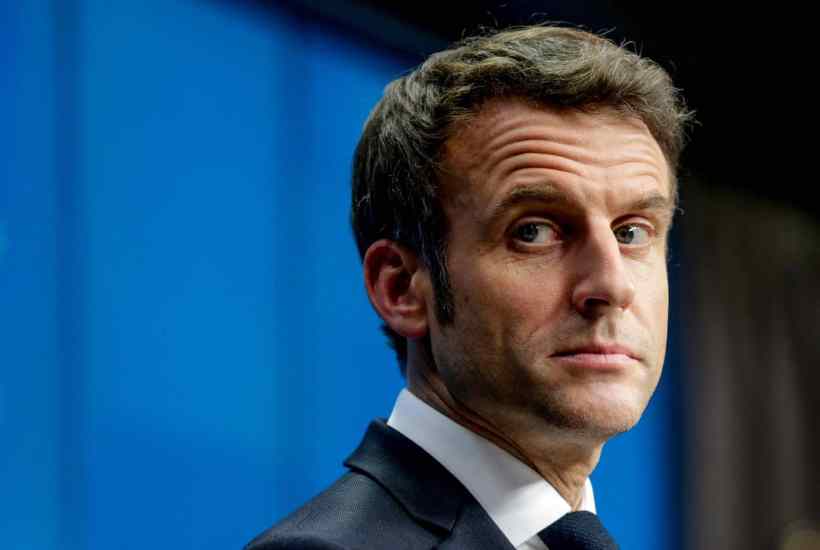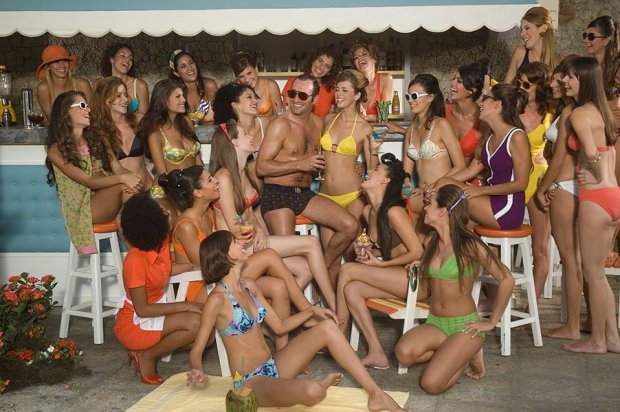Emmanuel Macron, the President of France for whom few voters have expressed much affection, is suddenly the leader of a nation (and by dint of his presidency of the European Council, the EU) in a de facto state of economic war with Russia. He is wiping the floor with his opponents in the forthcoming presidential election, benefiting from the congruence of international events and his refusal to descend into the electoral arena.
With 38 days to go before the first round of voting, the oxygen has been sucked out of the campaign. Macron’s efforts to diplomatically defuse the Ukraine crisis plainly failed – yet his approval ratings have skyrocketed, to over 50 per cent in one poll yesterday. His opposition is in danger of being reduced to a state of near irrelevance.
If Macron’s reelection was previously a near certainty simply because of the geometry of the electoral system, his defeat now seems practically unimaginable. The Economist model shows him with an 88 per cent chance of victory. Yet if the likely result of this election is predictable, the fascinating unknown is who will face Macron in the second round run-off on 24 April. Whoever faces him is almost certain to lose, but simply arriving in the second round can result in strategic positioning for the future.
This weekend was to have been huge for Éric Zemmour, the insurgent candidate on the right. In Toulon on Sunday he is preparing to announce the endorsement of Marion Maréchal, the smart, attractive rising star of the right – news that would normally be poll-shifting. It would be the renunciation of Marine Le Pen by her own niece, who appeals to moderate voters and was widely thought to have served with distinction as the youngest-ever deputy in the National Assembly. She left the Assembly after Marine Le Pen’s crushing defeat by Macron, five years ago. The two women do not get on.
But the announcement is at risk of passing almost unnoticed. Macron is topic A, B and C here. His television address on Wednesday night was more or less perfectly pitched. Standing in front of a Ukrainian flag, Macron pointed out the ‘lies’ of the Russian regime, its ‘propaganda’, and recalled the initiatives he had taken on the international scene to try to obtain a ceasefire and to rapidly put in place massive sanctions.
We are not at war with Russia. We are today at the side of all Russians who, refusing to allow an unworthy war to be waged in their name, have the spirit of responsibility and the courage to defend peace.
Perhaps that’s semantics. Earlier yesterday the economy minister Bruno Le Maire, declared that he absolutely wanted to wage an economic war against Russia. Words it’s assumed were straight from the President’s mouth, until Macron appeared to have doubts. Macron said the conflict would undoubtedly make its effects felt across Europe, including in France, where the prices of petrol, gas and everyday items are likely to rise.
Our agriculture, our industry, many economic sectors are suffering and will suffer, either because they depend on imports of raw materials from Russia or Ukraine, or because they export to this country. Our growth, now at its highest, will inevitably be affected.
Subtext: not my fault. A remarkable new poll today shows Macron’s three opponents on the right are level pegging on exactly 15 per cent each. That’s better for Zemmour, slightly worse for Le Pen of the Rassemblement (National Front rebrand), and not impressive for Valérie Pécresse, the official conservative Républicain. The momentum, if slight, seems to be with Zemmour. Perhaps Maréchal’s endorsement will push him forward.
Zemmour must know he almost certainly can’t win this election, even if he will have slightly bettered his chance of getting into the run-off. Though he’s condemned the invasion, he can certainly be accused of previous cosiness with the Russians.
Marine Le Pen has also embraced Putin in the past. A lot of her grassroots has doubts. She appears to have lost what was always an unconvincing poll lead over Zemmour. The campaign of Pécresse is stalled. Like Macron a graduate of the École National d’Adminisistration, who actually speaks Russian, she has failed to catch voter attention. The campaign of the red-green socialist Anne Hidalgo has become an embarrassment with scores of 2.5 per cent in some polls. Jean-Luc Mélenchon, the old-school lefty, claims he can get into the second round, but is barely in double digits and has zero chance.
If true that at the moment Macron is inevitably going to win, what happens next is not straightforward. Brutal increases in fuel prices and inflation generally seem inevitable. A new political alignment awaits. It’s hardly plausible that Macron will win a presidential majority in the forthcoming legislative elections. Weakened albeit re-elected, Macron’s ambitions for reforms will be kicked into touch. He’ll probably be forced into a ‘cohabitation’ coalition.
Macron will probably formally declare himself a candidate tomorrow but has already scaled back his ambitious ‘blitzkrieg’ campaign, cancelling a rally scheduled today in Marseilles, scaling back all further campaigning to a minimum. He will certainly lift the vaccine passport mandate before the election, essentially declaring Covid over, with himself the author of victory. His re-election looks inevitable. But the identity of his final challenger in the second determinative round remains utterly unpredictable.
Got something to add? Join the discussion and comment below.
Get 10 issues for just $10
Subscribe to The Spectator Australia today for the next 10 magazine issues, plus full online access, for just $10.



















Comments
Don't miss out
Join the conversation with other Spectator Australia readers. Subscribe to leave a comment.
SUBSCRIBEAlready a subscriber? Log in